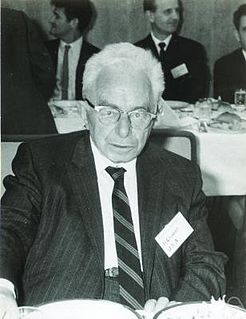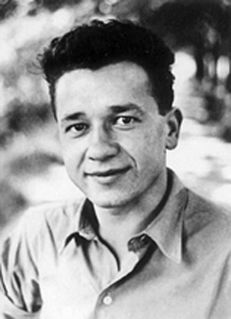A Quote by Niels Bohr
An independant reality in the ordinary physical sense can neither be ascribed to the phenomenon nor to the agencies of observation.
Quote Topics
Related Quotes
Reality is neither subjective nor objective, neither mind nor matter, neither time nor space. These divisions need somebody to happen to, a conscious separate center. But reality is all and nothing, the totality and the exclusion, the fullness and the emptiness, fully consistent, absolutely paradoxical. You cannot speak about it, you can only lose yourself in it.
As there is not in human observation proper means for measuring the waste of land upon the globe, it is hence inferred, that we cannot estimate the duration of what we see at present, nor calculate the period at which it had begun; so that, with respect to human observation, this world has neither a beginning nor an end.
Where there is Love and Wisdom, there is neither Fear nor Ignorance.
Where there is Patience and Humility, there is neither Anger nor Annoyance.
Where there is Poverty and Joy, there is neither Cupidity nor Avarice.
Where there is Peace and Contemplation, there is neither Care nor Restlessness.
Where there is the Fear of God to guard the dwelling, there no enemy can enter.
Where there is Mercy and Prudence, there is neither Excess nor Harshness.
To the scientist, nature is always and merely a 'phenomenon,' not in the sense of being defective in reality, but in the sense of being a spectacle presented to his intelligent observation; whereas the events of history are never mere phenomena, never mere spectacles for contemplation, but things which the historian looks, not at, but through, to discern the thought within them.
Such are the differences among human beings in their sources of pleasure, their susceptibilities of pain, and the operation on them of different physical and moral agencies, that unless there is a corresponding diversity in their modes of life, they neither obtain their fair share of happiness, nor grow up to the mental, moral, and aesthetic stature of which their nature is capable.
At the still point of the turning world. Neither flesh nor fleshless; Neither from nor towards; at the still point, there the dance is, But neither arrest nor movement. And do not all it fixity, Where past and future are gathered. Neither movement from nor towards, Neither ascent nor decline. Except for the point, the still point, There would be no dance, and there is only the dance.
It is impossible - now, at this point in the long journey of human culture - to avoid the sense that pain is necessity; that it is neither accident, nor malformation, nor malice, nor misunderstanding, that it is integral to the human character both in its inflicting and in its suffering, this terrible sense Tragedy alone has articulated, and will continue to articulate, and in so doing, make beautiful...
Humility is just as much the opposite of self-abasement as it is of self-exaltation. To be humble is not to make comparisons. Secure in its reality, the self is neither better nor worse, bigger nor smaller, than anything else in the universe. It is ? is nothing, yet at the same time one with everything. It is in this sense that humility is absolute self-effacement.




































